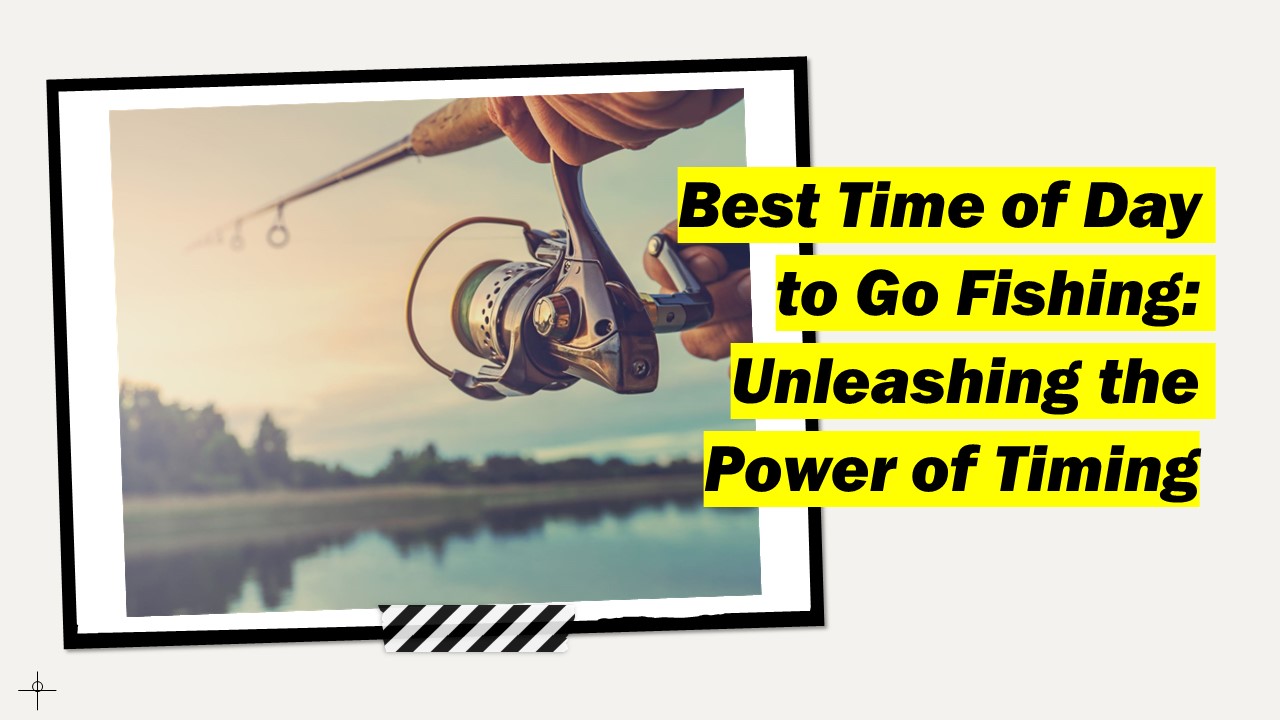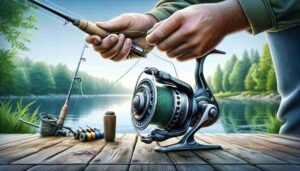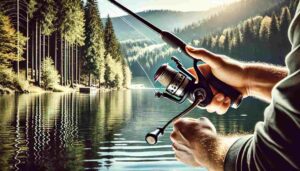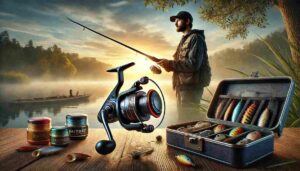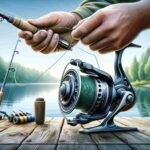Are you an avid angler or someone who simply enjoys the serenity of fishing? If so, you probably know that timing is everything when it comes to a successful day on the water. Welcome to the ultimate guide on finding the best time of day to go fishing!
As a fellow fishing enthusiast, I understand the excitement that comes with reeling in a big catch or enjoying a peaceful day surrounded by nature. In this guide, I’ll delve into the world of fishing and explore the factors that can significantly impact your fishing experience.
Whether you’re a beginner looking to improve your skills or a seasoned angler seeking new insights, this guide will provide you with valuable information to enhance your fishing adventures. So, grab your fishing gear, and let’s dive in to discover the secrets behind finding the perfect time to catch those elusive fish.
Understanding the Impact of Weather and Season
When it comes to fishing, the weather and season play crucial roles in determining your success on the water. Fish are highly influenced by their environment, and understanding how weather conditions and seasons affect their behavior can significantly improve your chances of a rewarding catch. Let’s explore the fascinating connection between fishing and the ever-changing elements.
The Significance of Weather Conditions on Fish Behavior
- Sunny days: Pros and cons
- Discuss how sunlight affects fish visibility and feeding patterns
- Highlight the benefits of fishing during sunny days, such as increased fish activity near the surface
- Mention the potential challenges, such as fish seeking shade or deeper waters to escape the heat
- Cloudy days: Advantages and disadvantages
- Explain how cloud cover can create an ideal fishing environment by diffusing sunlight
- Discuss the increased likelihood of fish venturing out of their hiding spots to feed in overcast conditions
- Mention the potential drawbacks, such as reduced visibility and the need to adapt fishing techniques accordingly
- Rainy days: How it affects fish activity
- Detail the impact of rain on fish behavior, including increased feeding activity and oxygen levels
- Discuss the advantages of fishing in the rain, such as the masking of angler presence and potential for aggressive strikes
- Mention the importance of safety and proper gear when fishing in inclement weather
How Different Seasons Influence Fishing Outcomes
- Spring: The awakening of fish
- Explain how the arrival of spring triggers a surge in fish activity and feeding patterns
- Discuss the importance of targeting shallower waters and areas with spawning activity during this season
- Highlight popular springtime catches and recommended techniques for maximizing success
- Summer: Exploring the depths for cool water
- Describe how fish tend to retreat to deeper waters to escape the summer heat
- Discuss the significance of water temperature and thermoclines in locating fish during this season
- Mention effective techniques for deep-water fishing and targeting specific species known to thrive in warmer conditions
- Fall: The feeding frenzy before winter
- Discuss the transition period as fish prepare for the colder months ahead
- Highlight the abundance of food sources during fall, leading to increased feeding activity
- Mention the importance of focusing on areas with changing foliage, drop-offs, and currents to locate active fish
- Winter: Strategies for ice fishing
- Explore the unique challenges and rewards of ice fishing during the winter season
- Discuss the importance of safety precautions, such as checking ice thickness and wearing appropriate gear
- Highlight effective techniques for targeting fish species that remain active beneath the ice
Understanding the influence of weather conditions and seasons on fish behavior is key to becoming a successful angler.
The Magic of Sunrise and Sunset
One of the most enchanting times to go fishing is during the golden hours of sunrise and sunset. These magical moments offer more than just stunning views; they hold the promise of incredible fishing experiences. Let’s explore why fishing during these times can greatly enhance your chances of success.
Why Sunrise and Sunset are Prime Fishing Times?
Sunrise and sunset are critical periods for fish activity due to several factors:
- Lighting conditions: The soft, angled light during these times provides better visibility for both fish and anglers.
- Temperature: The cooler temperatures at sunrise and sunset can be more favorable for fish to move and feed actively.
- Prey availability: Many aquatic organisms, such as insects and small baitfish, are most active during dawn and dusk, attracting larger predatory fish.
Benefits of Fishing during Sunrise
- Active feeding behavior: Fish tend to be more active and hungry in the early morning as they search for their first meal of the day.
- Less angler presence: During the early hours, there are typically fewer anglers on the water, allowing you to enjoy a quieter and less crowded fishing experience.
- Tranquility and serenity: Watching the world awaken while casting your line can be a serene and peaceful experience, connecting you with nature on a deeper level.
Advantages of Fishing at Sunset
- Evening feeding frenzy: As the day winds down, fish become more active again, actively feeding before settling in for the night.
- Beautiful scenery: Sunsets often paint the sky with breathtaking colors, providing a stunning backdrop for your fishing endeavors.
- Opportunities for nocturnal species: Many fish species, such as catfish and certain freshwater predators, are more active during the night. Fishing at sunset may be your chance to target these elusive nocturnal fish.
Personal Anecdotes and Experiences
Share personal stories or experiences of successful fishing outings during sunrise or sunset. Discuss memorable catches, the tranquility of the surroundings, or the joy of witnessing nature’s beauty during these magical moments. This personal touch adds a relatable and engaging element to the article.
So, set your alarm clock or pack your gear for an evening adventure, and let the mesmerizing colors of the sky guide you to fishing success.
Tides and Moon Phases
When it comes to maximizing your fishing opportunities, understanding the influence of tides and moon phases is like unlocking a hidden treasure chest of knowledge. These natural phenomena have a significant impact on fish behavior and feeding patterns. Let’s dive into the fascinating world of tides and moon phases to elevate your fishing game.
The Impact of Tides on Fishing Opportunities
- Incoming tides:
- Explain how incoming tides bring a surge of new water and nutrients, attracting baitfish and other prey species.
- Discuss the benefits of fishing during incoming tides, such as increased fish activity and feeding near the shoreline.
- Highlight effective techniques, such as targeting tidal currents, sandbars, or estuaries where fish gather to take advantage of the incoming flow.
- Outgoing tides:
- Describe how outgoing tides carry away baitfish and other prey, creating feeding opportunities for larger predatory fish.
- Discuss the advantages of fishing during outgoing tides, including the potential to locate fish in deeper channels and structure.
- Mention the importance of understanding the speed and strength of the current during outgoing tides for safer and more effective fishing.
The Connection between Moon Phases and Fishing
- Full moon:
- Explain the impact of a full moon on fish behavior, such as increased nocturnal feeding activity and enhanced visibility.
- Discuss the potential advantages of fishing during a full moon, such as targeting nocturnal species or fishing at night with the aid of moonlight.
- Mention any potential challenges, such as increased angler presence or fish becoming more cautious due to heightened visibility.
- New moon:
- Describe the effects of a new moon on fish behavior, such as reduced visibility and increased reliance on other senses.
- Discuss the benefits of fishing during a new moon, such as targeting fish that are less wary and more focused on scent or vibrations.
- Highlight the potential for successful fishing during low-light conditions, such as early morning or evening, when the moon is not visible.
Understanding the ebb and flow of tides and the phases of the moon can give you a strategic advantage in your fishing endeavors. Let nature’s rhythms guide you, and let the tides and moon be your allies in the pursuit of that prized catch.
Local Knowledge and Research
When it comes to fishing, tapping into local knowledge and conducting thorough research can significantly boost your chances of a successful outing. Understanding the specific nuances of your fishing location and gathering information from reliable sources will help you make informed decisions and optimize your fishing experience. Let’s explore the importance of local knowledge and research in enhancing your fishing adventures.
The Significance of Local Knowledge and Experience
- Emphasize the value of local knowledge:
- Explain how locals have a deep understanding of the area’s fishing hotspots, seasonal patterns, and preferred techniques.
- Discuss the benefits of connecting with experienced anglers or local fishing communities to gain insider tips and insights.
- Highlight the importance of observing and learning from locals:
- Encourage readers to observe local anglers’ fishing practices, such as where they fish, the bait they use, or the techniques they employ.
- Mention the significance of respecting local fishing regulations and guidelines to ensure sustainable fishing practices.
The Power of Research and Planning
- Researching fishing reports and forecasts:
- Advise readers to consult local fishing reports and forecasts, which provide valuable information on recent catches, water conditions, and fish behavior.
- Mention the availability of online resources, fishing forums, and apps that offer up-to-date information to aid in trip planning.
- Studying maps and charts:
- Encourage readers to study maps, charts, and satellite imagery of the fishing area to identify productive fishing spots, underwater structures, and potential areas of fish concentration.
- Understanding fish species and habitats:
- Emphasize the importance of researching the specific fish species present in the area and their preferred habitats, feeding habits, and seasonal migrations.
- Highlight the benefits of tailoring your fishing techniques, bait selection, and presentation to target the desired fish species.
Remember, each fishing location has its own unique characteristics and challenges, and being well-prepared with the right information will give you a competitive edge.
Factors to Consider Beyond Time of Day
While the time of day is undoubtedly important in fishing, there are several other factors that can greatly influence your success on the water. By considering these additional elements, you can refine your approach, adapt to changing conditions, and increase your chances of landing that trophy catch. Let’s explore some key factors to consider beyond just the time of day.
Water Temperature: Its Effect on Fish Behavior
- Discuss the impact of water temperature on fish activity:
- Explain how fish are cold-blooded creatures and their metabolism and behavior are directly affected by water temperature.
- Highlight the general temperature ranges preferred by various fish species and how they relate to their feeding patterns.
- Strategies for different water temperatures:
- Discuss techniques for fishing in warmer waters, such as targeting early morning or late evening when temperatures are cooler.
- Explain how to adapt your approach in colder waters, such as slowing down your presentation and focusing on deeper areas where fish seek warmth.
Location and Habitat: Targeting the Right Spots
- Importance of understanding the fishing location:
- Emphasize the significance of researching and understanding the specific characteristics of the water body you’ll be fishing in, including its depth, structure, and vegetation.
- Identifying productive fishing spots:
- Discuss popular fish-holding locations, such as drop-offs, points, submerged structures, and areas with underwater vegetation.
- Mention the significance of paying attention to changes in the underwater landscape, such as ledges, rock formations, or submerged logs.
Fish Species: Tailoring Your Approach
- Understanding the behavior and preferences of target species:
- Discuss the specific feeding habits, preferred baits, and techniques for the fish species you’re targeting.
- Provide tips on how to identify signs of fish activity, such as surface disturbances, baitfish schools, or birds diving.
- Adapting your gear and bait selection:
- Highlight the importance of matching your fishing gear, such as rod, reel, line weight, and hook size, to the target species.
- Discuss the significance of using bait or lures that closely resemble the natural prey of the fish you’re targeting.
Fishing Equipment and Bait: Choosing the Right Tools
- Discuss the importance of using appropriate fishing equipment:
- Explain how using the right gear for the fishing technique and target species can improve your casting accuracy, hook-setting ability, and overall fishing experience.
- Highlight the benefits of selecting the right bait or lures:
- Discuss the advantages of using live bait, artificial lures, or specific types of bait that are proven to attract the target fish species.
- Mention the importance of experimenting with different colors, sizes, and presentations to find what works best in different fishing situations.
By considering factors beyond the time of day, you can adapt your fishing approach to suit changing conditions and increase your chances of success. From understanding water temperature and identifying productive spots to tailoring your techniques to the target species and using the right equipment, every detail counts in the pursuit of a rewarding fishing experience.
Personal Preparation and Patience
In the world of fishing, personal preparation and patience are virtues that can make a significant difference in your overall experience and success. As you embark on your fishing adventures, taking the time to prepare yourself physically, mentally, and with the right mindset will enhance your enjoyment and increase your chances of landing that dream catch. Let’s delve into the importance of personal preparation and the role of patience in the pursuit of fishing greatness.
Be Well-Prepared and Organized
- Gear and equipment:
- Emphasize the importance of having your fishing gear in good condition, including rods, reels, lines, hooks, and any additional equipment you may need.
- Encourage readers to double-check their tackle box, ensuring they have a variety of bait, lures, weights, and other essentials for different fishing scenarios.
- Proper clothing and accessories:
- Discuss the significance of wearing comfortable, weather-appropriate clothing and footwear for extended periods on the water.
- Mention the importance of sunscreen, hats, sunglasses, insect repellent, and other accessories to protect yourself from the elements.
- Safety precautions:
- Highlight the need for personal safety by wearing life jackets or flotation devices, especially when fishing from boats or in potentially hazardous areas.
- Encourage readers to inform someone of their fishing plans, including their location and estimated return time, as an extra precaution.
The Power of Patience
- Highlight the virtue of patience:
- Discuss how fishing often requires waiting for the right moment and being patient as you observe and adapt to changing conditions.
- Explain that patience allows you to appreciate the beauty of nature, reflect on your surroundings, and enjoy the process of fishing itself.
- Staying focused and observant:
- Encourage readers to pay attention to subtle cues, such as water ripples, bird activity, or changes in fish behavior, that may indicate the presence of fish or an impending bite.
- Explain the importance of staying mentally engaged and ready to respond when the fish strike.
- Persistence and learning from experiences:
- Highlight the value of persistence in fishing, as not every outing may yield immediate success.
- Encourage readers to view each fishing trip as an opportunity to learn and improve their skills, even when the catch is elusive.
Remember, fishing is not just about the end result but also about immersing yourself in the natural environment, appreciating the journey, and embracing the moments of tranquility.
Conclusion
Congratulations! You have now gained a comprehensive understanding of the best time of day to go fishing and the various factors that can influence your fishing success. From considering the impact of weather conditions and seasons to harnessing the magic of sunrise and sunset, tides and moon phases, local knowledge, and beyond, you are well-equipped to embark on unforgettable fishing adventures.
Remember, fishing is not just about the catch—it’s a journey that allows you to connect with nature, unwind from the hustle and bustle of everyday life, and create lasting memories. By applying the knowledge you have gained and combining it with your own experiences, you will continue to refine your skills and discover the unique joys that fishing has to offer.
So, whether you’re casting your line at dawn, waiting for that magical sunset bite, or exploring new fishing spots armed with local wisdom, embrace the excitement, cherish the tranquility, and be open to the unexpected. Each fishing trip is an opportunity to immerse yourself in the beauty of nature, learn from the water’s rhythms, and appreciate the wonders that lie beneath the surface.
Now, gather your gear, pack your enthusiasm, and venture out into the waters. Experiment, adapt, and discover your own favorite fishing times. With the right timing, patience, and preparation, you are bound to create unforgettable fishing memories and reel in the catches of a lifetime.
Happy fishing!
You may also want to know the best time of day to catch bass in every season.


